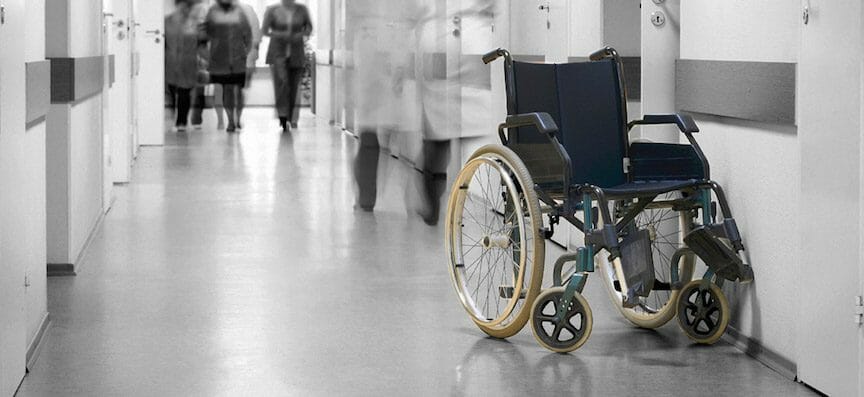- November 27, 2023
- Nursing Home Abuse
A Wrongful Death Lawyer Can Help You Sue a Nursing Home if A Patient’s Death Is a Result of Negligence, Neglect, or Abuse.
Can you sue a nursing home for wrongful death? Depending on the circumstances, you may have a case. Nursing home staff have a duty to care for individuals with serious medical issues and the need to live in facilities with specialized medical care. When care is inadequate and a loved one dies due to the home’s negligence or fault, a nursing home abuse attorney may be able to hold the nursing home liable through a wrongful death lawsuit.
If your loved one died in a nursing home due to abuse, neglect, medical mistakes, or inadequate care, our Asheville nursing home lawyer at Lakota Denton can help you understand your rights and determine the best approach to take to secure compensation for your losses. Contact us to schedule a free consultation to learn more.
Can You Sue A Nursing Home For Wrongful Death?

When we place our frail, elderly, and vulnerable loved ones in a nursing home, we expect them to receive competent care and be kept safe from harm. If they are the victim of negligence that causes their death, we respond with shock and anger. We want those responsible to be brought to justice.
This often takes the form of filing a wrongful death lawsuit against the facility and perhaps even individuals who are tied to the death. Through this, the family can seek compensation for the loss of their loved one. While money cannot replace that person in your life, a successful lawsuit will bring justice by holding the nursing home accountable.
Bringing these actions to light will help make sure the negligent behavior stops so other vulnerable residents will not be harmed. To do so with the most impact, you should consider working with an accomplished wrongful death attorney in Asheville, NC.
How a Nursing Home Abuse Lawyer Can Help You
North Carolina law defines a “wrongful death” as one that is caused “by a wrongful act, neglect, or default of another” person or entity, of a kind that would have entitled the person to file a personal injury lawsuit had they survived (N.C. Gen. Stat. § 28A-18-2). Essentially, the personal representative of the deceased is taking the same actions, with a different name, as the loved one would have if they were still alive.
At Lakota Denton, our nursing home wrongful death lawyers will immediately get to work on your lawsuit to fight for a fair settlement. Our professional legal team can help with your wrongful death action by taking the following steps:
- Evaluate your case to determine if it is valid and what it may be worth
- Investigate the circumstances of the death to determine all potential defendants who may have been at fault
- Gather evidence to prove negligence, such as from videos and photographs, police and medical reports, and other relevant documents
- Interview witnesses, residents, and staff
- Obtain expert medical opinions as to how neglect led to the death
- Correspond with all potentially involved insurance companies and identify all possible sources of financial recovery
- Demand payment and negotiate aggressively with insurance companies for a fair settlement
- Build your case, take it to trial, and present it to a judge and jury, if necessary.
Insurance companies and their attorneys tend to take your case more seriously and negotiate accordingly if they know you have an attorney on your side who is willing to take your case to court. Otherwise, you may get a lot of pushback because adjusters know you probably aren’t familiar with complex laws and insurance policies. When you have a powerful legal advocate with you, they are often more willing to make a better settlement offer rather than take the chance of losing in court.
Important Legal Considerations Affecting Your Nursing Home Wrongful Death Claim
Filing and successfully completing a nursing home wrongful death claim is complicated. In addition to understanding the process of a lawsuit or insurance claim, you must be aware of important laws in North Carolina that could affect how you proceed. Most of these deal with who can bring a lawsuit and how quickly they should do so.
Who Can File a Wrongful Death Claim
In North Carolina, the wrongful death statute (N.C. Gen. Stat. § 28A-18-2) allows only the deceased’s personal representative (PR) to file the claim. If they didn’t name a PR, then the family can file a petition with the court to name someone. The family can then express their wishes to the PR about how to proceed, but only the PR may be named in the legal action.
When the Claim Must Be Filed
With very few exceptions, all legal matters are subject to a statute of limitations. N.C. Gen. Stat. § 1-53 requires that the personal representative of the deceased must file their case within two years after the death. If the case is not submitted before that time, the plaintiffs lose their right to secure compensation through the courts.
Where the Settlement Money Goes
The PR files the wrongful death claim on behalf of the loved one’s estate. However, the settlement doesn’t become another asset in the estate. Instead, N.C. Gen. Stat. § 29-14 describes the order in which the compensation will be distributed:
- Surviving spouse or legal partner
- Children of the deceased (biological or legally adopted)
- Grandchildren of the deceased (biological or legally adopted)
- Surviving parents of the deceased
- Siblings of the deceased.
This doesn’t mean everyone will get the same share of the settlement. How much they receive will be determined by how large a share of the estate they are entitled to receive. Typically, this is the spouse and children, but it can get very complicated. It’s best to consult with an experienced wrongful death attorney who can correctly interpret the statute in your specific circumstances.
How To Win A Case For Wrongful Death In A Nursing Home

To win your case, you must prove another party was negligent and at fault for causing your loved one’s death. Proving negligence legally means establishing the existence of the following factors:
- Duty: The nursing home had a duty to care for the resident.
- Breach: The nursing home breached this duty and failed to provide the required standard of care.
- Cause: The nursing home’s misconduct caused the resident’s death.
- Damages: You suffered damages as a result.
In a nursing home wrongful death lawsuit, there may be multiple parties who can be held responsible. Liable parties may include the person who abused or injured the resident, as well as any doctors, nurses, attendants, or other residents who may have caused harm. Your attorney will also investigate the owners and administrators of the facility who knew or should have known that a resident was being hurt and failed to prevent further abuse.
Each of these parties may have insurance or assets that can go toward a settlement award, so your legal team will name them in the lawsuit. Many nursing homes are now owned by massive conglomerates that don’t do a good job of protecting the residents. At Lakota R. Denton, P.A., we are fully prepared to go up against any large corporation that may own, manage, or be involved with the home.
What Damages Can Be Recovered in a Lawsuit?
Damage amounts in a wrongful death settlement can vary greatly, depending on the circumstances of the death and the individual factors involved. In general, surviving family members may be able to recover financial awards to compensate for their losses, which include:
- Funeral expenses
- Loss of consortium
- Medical treatments related to the cause of death
- Pain and suffering
- Emotional distress
- The deceased’s reasonably expected net income
- Loss of the loved one’s services, protection, care, and assistance
- Loss of the deceased’s society, companionship, comfort, guidance, and advice.
In addition, in some rare cases, punitive damages, which are designed to punish and deter wrongful conduct, may also be recovered. The purpose is to send a strong message and help to protect nursing home residents in the future from suffering harm.
Situations That Can Lead to the Death of Nursing Home Residents
When you need to choose a nursing home for your family member, it can be a difficult decision. You want them to be cared for when you cannot do it, but you’re putting your loved one in the hands of strangers. When there is an incident of abuse or death, you will grieve but also look for the answers to why it happened.
Unfortunately, there are many situations in nursing homes that can lead to the death of residents. Among the most common causes are:
- Understaffing: Nursing homes may hire less staff in an effort to increase profits, or they may not be able to attract and retain adequate staff to supervise and provide assistance to residents.
- Unsafe conditions: Unsafe conditions such as slippery floors, obstructions and equipment in hallways, furniture that is too high or too low, poor lighting, belongings placed out of reach, and lack of proper safety equipment in bathrooms may cause falls that result in death.
- Medication errors: When medications are not properly monitored, distributed, or locked away, there is a chance patients may be overdosed. Many nursing home residents are medicated to keep them calm, but too much medicine could result in falls or other injuries that lead to death.
- Lack of training: There are numerous cases of staff members who have not been properly vetted, trained, and supervised to prevent abuse. In addition, there is little tracking for previous offenders, who may simply travel to another state and get work at another nursing home.
- Insufficient monitoring: Without an established system of regular monitoring and checks, and technology such as cameras, fall alerts, and alarms, residents are at risk of wandering away from the home.
- Abuse or neglect: Nursing homes are hotbeds for ongoing abuse or neglect by staff members and other residents. When the staff, doctors, nurses, or others fail to report and stop this activity, your family member may die as a result.
Call Our Nursing Home Wrongful Death Attorney for Help
Lakota Denton has successfully taken wrongful death cases to trial and obtained verdicts from juries. If your loved one has died a wrongful death in a nursing home, we are prepared to represent you in your search for justice.
Don’t delay. It’s best to start investigating these cases immediately while evidence is fresh and witnesses can be found. Remember that North Carolina allows just two years after the death to file your case. Otherwise, you lose your right to compensation forever.
Call today at 828-333-5996 to schedule a free and confidential initial consultation. There are no fees to you unless and until we win your case.

 Lakota Denton has been practicing in his own firm since 2013, focusing solely on personal injury. He is a member of the American Association of Justice, the North Carolina Advocates for Justice, the North Carolina Bar association, the American Bar Association, the National Trial Lawyers, and was awarded Top 100 Trial Lawyers by the National Trial Lawyers, the 2014 Top 40 Lawyers under 40, and the Avvo clients choice award. [
Lakota Denton has been practicing in his own firm since 2013, focusing solely on personal injury. He is a member of the American Association of Justice, the North Carolina Advocates for Justice, the North Carolina Bar association, the American Bar Association, the National Trial Lawyers, and was awarded Top 100 Trial Lawyers by the National Trial Lawyers, the 2014 Top 40 Lawyers under 40, and the Avvo clients choice award. [